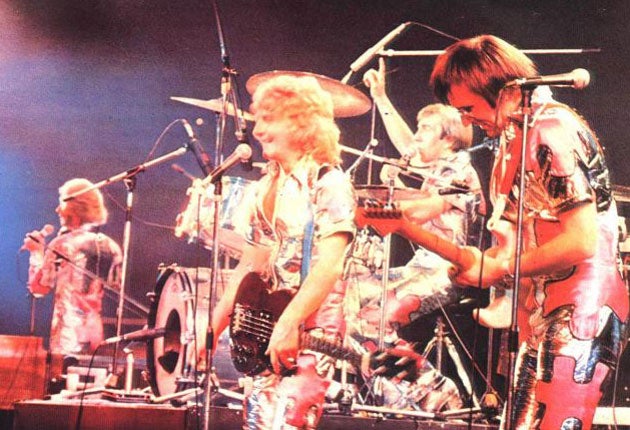Clive Scott: Keyboard-player, singer and songwriter with the Seventies pop group Jigsaw

Your support helps us to tell the story
From reproductive rights to climate change to Big Tech, The Independent is on the ground when the story is developing. Whether it's investigating the financials of Elon Musk's pro-Trump PAC or producing our latest documentary, 'The A Word', which shines a light on the American women fighting for reproductive rights, we know how important it is to parse out the facts from the messaging.
At such a critical moment in US history, we need reporters on the ground. Your donation allows us to keep sending journalists to speak to both sides of the story.
The Independent is trusted by Americans across the entire political spectrum. And unlike many other quality news outlets, we choose not to lock Americans out of our reporting and analysis with paywalls. We believe quality journalism should be available to everyone, paid for by those who can afford it.
Your support makes all the difference.With its dramatic introduction and big orchestral flourishes, “Sky High”, the 1975 Top Ten hit by Jigsaw, sounded like a long-lost theme to a James Bond film. Fittingly enough, it was the main theme song from The Man from Hong Kong, an action picture directed by the British journeyman Brian Trenchard-Smith and starring the martial arts star Jimmy Wang Yu, as well as the Australian actor George Lazenby, six years after his lone outing as Bond in On Her Majesty’s Secret Service.
Written in three days by keyboardplayer and vocalist Clive Scott and drummer Des Dyer, who sang lead on the single, “Sky High” became the debut hit for Jigsaw, a Warwickshire group formed in 1966. It was a worldwide smash, most notably topping the Japanese charts on two separate occasions after being adopted as the intro music for Mil Mascaras, a Mexican wrestler with a big Japanese following, and featuring in Toyota commercials. It also reached No. 3 in the US in 1975.
In fact, Jigsaw proved more popular in the States than in their home country, making the Top 30 there with “Love Fire” in 1976, while “If I Have to Go Away” charted on both sides of the Atlantic the following year. With Dyer, Scott also wrote the irresistible pop song “Who Do You Think You Are”, which the Opportunity Knocks winners Candlewick Green took into the British hit parade in 1974. The composition also became a US hit for the American pop group Bo Donaldson and the Heywoods that same year, and was revived in 1993 by Saint Etienne, the British trio with impeccable taste in cover versions.
Born in 1945, Scott had been the front man of Scott and the Antarctics before joining Jigsaw, named after The Jigsaw Club in Manchester. Originally a sextet, the band backed the soul singer Arthur Conley on a British tour in 1970 and eventually slimmed down to a four-piece, comprising guitarist and nominal leader, Tony Campbell, bassist Barrie Bernard and the creative core of Scott and Dyer. Between 1968 and 1971 they issued half a dozen singles and two albums, including the psychedelic Letherslade Farm (1970).
They failed to make the charts, however, despite their strong reputation as a live band. In 1974, Scott and Dyer took the advice of a New York music publisher and began fashioning poppier, more upbeat material with mainstream potential. Their success as the writers of “Who Do You Think You Are”
should have provided the ideal launch pad, but the BASF company saw it differently, and dropped the group after two singles and one album entitled I’ve Seen the Film, I’ve Read the Book. Undeterred, manager Chas Peate, Scott and Dyer used some of their publishing income to fund their own label called Splash. The operation lived up to its name with the success of “Sky High”, which grew from a few plays on Radio Luxembourg to national and international success. However, despite issuing several self-penned catchy followup singles – “Mention My Name”, “Paint the Smile On”, “The Beginning of the End” – Jigsaw struggled to establish a strong enough identity and remain best known in the UK for their radio-friendly signature song.
In 1979, the band wrote several songs for Home before Midnight, a controversial film set in the music industry.
Directed by Pete Walker, it featured James Aubrey and Chris Jagger as well as cameos by radio presenters Annie Nightingale and David Hamilton, but it has been little seen since its release. Jigsaw soldiered on and released nine albums in total, but broke up in 1983 after the “Love Isn’t at Home” single.
Scott subsequently concentrated on songwriting and production, and with Ray Hedges, oversaw several recordings that The Nolans made for the Japanese market. In the Nineties, he teamed up with the Northern Soul DJ turned producer Ian Levine and worked with Blue, Billie Piper, Gloria Gaynor and the Italian artist Lorenz.
He briefly revived Jigsaw with “Let’s Not Say Goodbye” and also helped Levine on the Northern Soul 2007 project featuring the likes of Jimmy James and the Flirtations.
Scott was well-liked, generous with his time and keen to help the artists who came to his studio in Ascot. He fell off a ladder at his home at the end of April and suffered a stroke. He died after undergoing brain surgery. Paying tribute to Scott, Levine said: “He was the yin to my yang, my right arm. He was a great person to work with.”
Pierre Perrone
Clive Scott, singer, songwriter, keyboardplayer, producer: born Coventry 24 February 1945; married (one son); died Ascot, Berkshire 10 May 2009.
Subscribe to Independent Premium to bookmark this article
Want to bookmark your favourite articles and stories to read or reference later? Start your Independent Premium subscription today.
Join our commenting forum
Join thought-provoking conversations, follow other Independent readers and see their replies
Comments